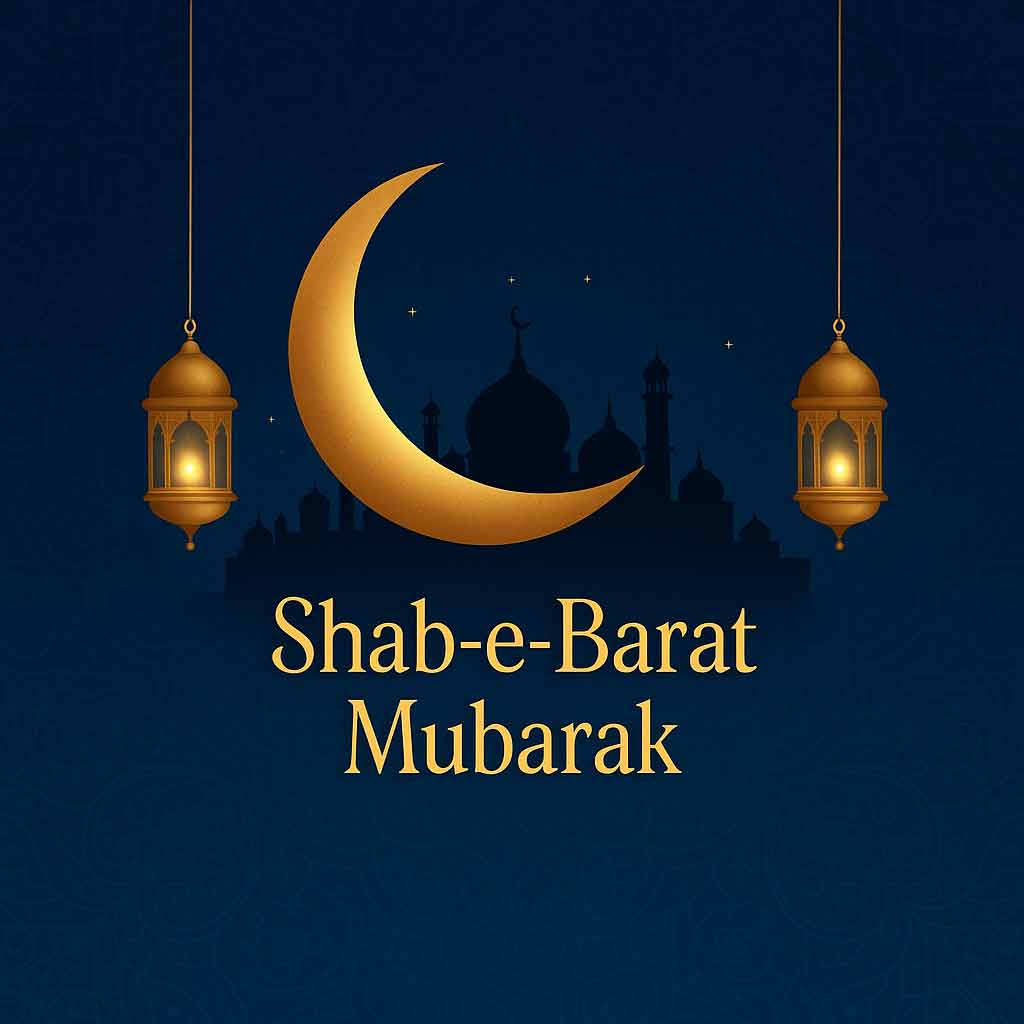Shab-e-Barat Mubarak
– The Night of Forgiveness and Divine Mercy

Shab-e-Barat Mubarak: The Night of Forgiveness and Divine Mercy
Shab-e-Barat, also known as Laylat al-Bara’ah or The Night of Forgiveness, is one of the most blessed nights in the Islamic calendar. It falls on the 15th night of Sha’ban, the month preceding Ramadan. The term “Shab-e-Barat” originates from Persian and Arabic — “Shab” meaning night and “Barat” meaning deliverance or salvation — symbolizing a night when Allah’s mercy and forgiveness embrace His servants.
This sacred night holds immense spiritual significance for Muslims around the world. It is believed to be the night when Allah Almighty decrees the destinies of His creation for the coming year — including matters of life, death, sustenance, and fortune. It is also considered a time when Allah forgives the sins of those who sincerely seek His pardon, opening the doors of mercy wider than ever before.
The Spiritual Essence of Shab-e-Barat
Shab-e-Barat is not merely a night of ritual; it is a night of reflection, repentance, and renewal of faith. Muslims spend the night in prayer, remembrance (zikr), and supplication, seeking forgiveness for their past deeds and praying for a better, more righteous future.
According to Islamic tradition, the Prophet Muhammad (peace be upon him) emphasized the virtue of the 15th night of Sha’ban. It is reported that he would engage in worship and encourage believers to spend the night in prayer and the following day in fasting. The Prophet (PBUH) said:
“Allah descends to the lowest heaven on the night of the middle of Sha’ban and forgives more people than the hairs on the sheep of Banu Kalb.”
(Hadith – Ibn Majah)
This narration beautifully captures the spirit of Shab-e-Barat — a night overflowing with divine compassion and forgiveness. It reminds Muslims that no matter how great their sins, Allah’s mercy is greater still, and sincere repentance can wipe away the darkest of pasts.
Practices and Observances
Across the world, Muslims observe Shab-e-Barat in diverse yet deeply spiritual ways. Mosques are illuminated, and homes are adorned with gentle lights, symbolizing the hope and purity of the night. Believers perform voluntary prayers (Nafl), recite verses from the Holy Qur’an, and offer dua (supplications) for their families, the deceased, and all of humanity.
Many visit graveyards to offer prayers for their departed loved ones, seeking Allah’s mercy for the souls who have passed away. The act of remembrance connects the living with the departed, inspiring humility and reflection on the fleeting nature of life.
In several cultures, simple acts of charity mark the observance of the night. Distributing food, helping the needy, and extending goodwill to others embody the essence of Islam’s compassion and community spirit.
A Prelude to Ramadan
Shab-e-Barat also serves as a spiritual prelude to Ramadan — the holiest month in Islam. It encourages believers to cleanse their hearts and prepare themselves mentally, spiritually, and emotionally for the month of fasting and reflection ahead. By seeking forgiveness and making amends during Shab-e-Barat, one enters Ramadan with renewed sincerity and peace of mind.
The night also reminds Muslims to reconcile with one another — to forgive those who have wronged them and to seek forgiveness from those they may have hurt. Such acts of reconciliation amplify the blessings of the night and strengthen the bonds of brotherhood and harmony within the community.
The Message of Shab-e-Barat
At its core, Shab-e-Barat is about mercy, humility, and transformation. It invites believers to introspect — to look beyond worldly distractions and reconnect with the divine. It teaches that life is fragile, time is fleeting, and every soul has the opportunity to turn back to Allah.
The night offers a message of hope: that no one is beyond redemption, and every heart that seeks forgiveness will find Allah waiting with open arms. As the Qur’an beautifully reminds us:
“Say: O My servants who have transgressed against themselves, do not despair of the mercy of Allah. Indeed, Allah forgives all sins. Indeed, it is He who is the Forgiving, the Merciful.”
(Surah Az-Zumar, 39:53)
Shab-e-Barat Mubarak is more than a greeting — it is a heartfelt prayer that Allah blesses every believer with peace, prosperity, and pardon. It is a night that calls for quiet reflection, heartfelt supplication, and renewed commitment to goodness. As the lamps glow and prayers ascend, may every soul find forgiveness, and may Allah’s mercy encompass the world.
Shab-e-Barat Mubarak to all — a night of peace, light, and divine forgiveness.
